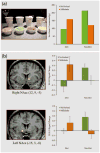Cognitive neuroscience of self-regulation failure
- PMID: 21273114
- PMCID: PMC3062191
- DOI: 10.1016/j.tics.2010.12.005
Cognitive neuroscience of self-regulation failure
Abstract
Self-regulatory failure is a core feature of many social and mental health problems. Self-regulation can be undermined by failures to transcend overwhelming temptations, negative moods and resource depletion, and when minor lapses in self-control snowball into self-regulatory collapse. Cognitive neuroscience research suggests that successful self-regulation is dependent on top-down control from the prefrontal cortex over subcortical regions involved in reward and emotion. We highlight recent neuroimaging research on self-regulatory failure, the findings of which support a balance model of self-regulation whereby self-regulatory failure occurs whenever the balance is tipped in favor of subcortical areas, either due to particularly strong impulses or when prefrontal function itself is impaired. Such a model is consistent with recent findings in the cognitive neuroscience of addictive behavior, emotion regulation and decision-making.
Copyright © 2010 Elsevier Ltd. All rights reserved.
Figures


References
-
- Baumeister RF, et al. Losing control : how and why people fail at self-regulation. Academic Press; 1994.
-
- Hofmann W, et al. Impulse and Self-Control From a Dual-Systems Perspective. Perspect Psychol Sci. 2009;4:162–176. - PubMed
-
- Wagner DD, Heatherton TF. Giving in to temptation: The emerging cognitive neuroscience of self-regulatory failure. In: Vohs KD, Baumeister RF, editors. Handbook of self-regulation : research, theory, and applications. 2. Guilford Press; 2010.
-
- Baumeister RF, Heatherton TF. Self-Regulation Failure: An Overview. Psychol Inq. 1996;7:1–15.
Publication types
MeSH terms
Grants and funding
LinkOut - more resources
Full Text Sources
Medical

